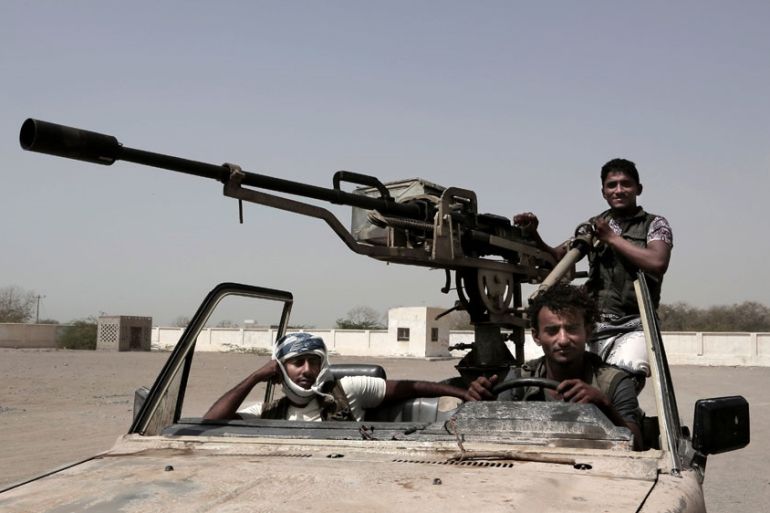Yemen’s warring sides agree to pullback from Hodeidah: UN
Located on Yemen’s western coast, Hodeidah provides access to Bab al-Mandeb, the fourth busiest waterway in the world.

Yemen’s warring sides have agreed on the first phase of a pullback of forces from the key city of Hodeidah, in a deal the United Nations has described as “important progress”.
Hodeidah, which is located on Yemen’s western coast and provides access to the Bab al-Mandeb Strait – the fourth busiest waterway in the world – has been in Houthi hands since 2014, when the armed group staged a takeover of large swaths of Yemen.
Keep reading
list of 4 itemsUS sanctions shipping firm accused of links to Iran, Yemen’s Houthis
Vessel struck in Red Sea as Houthis promise attacks on more shipping lanes
What we know about deadly Houthi attack on cargo ship
The move prompted the military intervention of Saudi Arabia, the United Arab Emirates (UAE) and allies the following year on behalf of the embattled government, triggering what the UN calls the world’s worst humanitarian crisis.
Following two days of talks in Hodeidah, the government and Houthis finalised a deal on the first phase of the pullback and also agreed in principle on the second phase, a UN statement said on Sunday.
“After lengthy but constructive discussions facilitated by the RCC Chair, the parties reached an agreement on Phase 1 of the mutual redeployment of forces,” the UN statement said.
|
|
The sides made “important progress on planning for the redeployment of forces” but no date was given to begin the demilitarisation.
“The parties also agreed, in principle, on Phase 2 of the mutual redeployment, pending additional consultations within their respective leadership.”
The redeployment from Hodeidah is a critical part of a ceasefire deal reached in December in Sweden that calls on the government and Houthi rebels to move forces away from ports and parts of the city.
Under the vaguely worded agreement, three of Hodeidah’s ports – Hodeidah, Saleef and Ras Isa – which serve as a major lifeline for more than 18 million Yemenis who live in the rebel-held territory, were expected to fall under the control of “local forces”.
Under the Stockholm agreement, the pullback was supposed to have taken place two weeks after the ceasefire went into force on December 18, but that deadline was missed.
Food rotting in Hodeidah
The UN is hoping that the de-escalation in Hodeidah will allow desperately needed food and medical aid to reach millions in need in Yemen.
The Red Sea port is the entry point for the bulk of imported goods and relief aid to Yemen and is home to the Red Sea Mills silos – which are believed to contain enough grain to feed several million people.
But according to the World Food Programme, the granary has been off-limits to aid organisations for months putting the food at risk of rotting.
Earlier this week, the UN said that four years of war had pushed two-thirds of Yemen to “pre-famine” levels, while one-third faced “acute vulnerabilities”.
“An estimated 80 percent of the population, 24 million, require some form of humanitarian or protection assistance, including 14.3 million who are in acute need,” the OCHA statement said.
“Severity of needs is deepening, with the number of people in acute need a staggering 27 percent higher than last year.”
The war in Yemen has been at a stalemate for years, with the coalition and Yemeni forces unable to dislodge the Houthis from the capital Sanaa and most urban centres.
According to the charity Save the Children, an estimated 85,000 children may have starved to death over the past four years of war.
